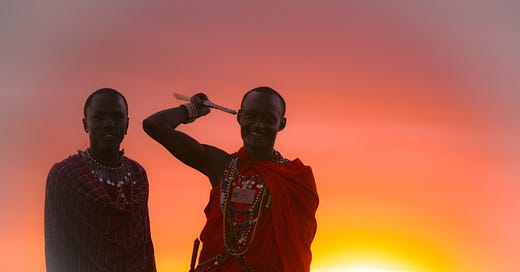Our Beautiful Paradoxical Dichotomous World
What might we see when we view the artificial intelligence dialogue from a Maasai warrior's point of view?
Cowherders by day. Tourist guards at night. Protecting safari visitors straying too far from their tents and being caught in the maw of grazing hippopotami or an occasional lion. Are these mostly traditional tribal folk part of the global artificial intelligence outcomes, in the most important technology transformation in this era of humankind?
It's hard to say, because no one — that is zero, no one — has any idea where artificial intelligence will lead.
As I sit here, quietly contemplating the brilliant sunset behind those two Maasai warriors, photographed near the Mara River in Kenya, some questions arise in my mind.
When you see that image, does the first question that comes to your mind look something like this —
“My, those poor fellows! They look quite disconsolate and forlorn that they are missing out on the latest technology and a digitized life!”
Ummmmmm. You either? Exactly.
My immediate impression was, "What a magnificent sunset, showcasing two handsome, apparently content and confident young men, who seem happy with the world at large."
Maybe this is such a small, technologically integrated world that they are conscious of the big artificial intelligence (AI) question that is consuming the technology-driven world. Maybe not. Probably not. However, it does forcefully occupy the minds of many.
Earlier this year, I was in Panama City, Central America, for the Beneficial Artificial General Intelligence (AGI) Summit and Unconference. A collection of the world's top thought leaders in AI and robotics convened to discuss leveraging human wisdom and values to guide the evolution of AI.
Not all the great minds thinking about AI were gathered of course, because it's on everyone's minds, more or less, and there are many disparate agendas and convocations. But a significant proportion of the leading scientists, technologists, and philosophers who specialize in AI, were in this one place.
Their consensus opinion about the effect on the planet's future of the rising tide of AI is this: "We don't know."
There was optimism from some. Grave caution from others. Some think that massive controls need to be put in place. Their more optimistic counterparts ask the pessimists to answer, (a) how is AI to be constrained when it can't even be properly defined, and (b) constrained against what threats, and (c) by whom against whom, and (d) who will be entrusted with such controls, (e) if such controls are possible?
Some think that AI, in the form of a movement called transhumanism, is both the salvation and immortality of humanity. That is one form of hope, through technology.
It seems Pope Francis is also cautiously optimistic, because of his religious faith. During his most recent World Day of Peace speech he concluded with the hope that ... "men and women of good, will work together in harmony, to embrace the opportunities and confront the challenges posed by the [AI-driven] digital revolution, and thus hand on to future generations a world of greater solidarity, justice and peace."
However, there are prominent futurists who are thoroughly fearful of the outcomes in a world where AI may be in the hands of those with malevolent intent, or unethical or laissez-faire practices, or the emergence of a genius with unbridled passion that might let loose an uncontrollable genie on the world, or all the above.
A number of moderate voices believe AI can be a huge blessing, if channeled, constrained, managed, and controlled. Agreeing on the nature of those controls, and who owns the levers, is one of the great questions about the future of humanity in light of a new kind of "intelligence" in our midst.
The convenor of the Panama conference was Ben Goertzel. His is one of the seriously optimistic voices in the AI conversation. He was the Chief Scientist of Hanson Robotics, the company that created the Sophia robot.
Sophia's architecture included scripting software, a chat system, and OpenCog, an AI system designed for general reasoning. More recently, Goertzel founded SingularityNet, a decentralized AI blockchain marketplace.
His general demeanor is to let things go where they will, allowing natural forces to exert their influence to counterbalance extremism. If we do that, he said, "I think we do have reason for cautious optimism." Goertzel's optimism led him to close the conference with a prediction that AI with human-like general reasoning is less than a decade away.
I wonder, as do many others, what will be better in our daily lives, and what will be worse, because of the expanding effects of AI. I can't visualize how AI will have much of a direct effect on the lifestyle of those with lesser dependence on technology, such as the men pictured above.
Still, I do have two conclusions arising from the thought process stimulated by my new Maasai friends: (1) No one knows how AI will progress nor how it will impact everything it touches, and (2) Everyone has an interest and a responsibility in the AI conversation, it is not just the domain of a handful of elites, it is humanity's problem and opportunity.
I am watching the AI space on behalf of Veritas Chronicles. It is one of the most important conversations currently playing out on Planet Earth. The technologies, ethics, and applications of AI are integral to this and all future generations, even for those who aren't paying attention — yet. §





